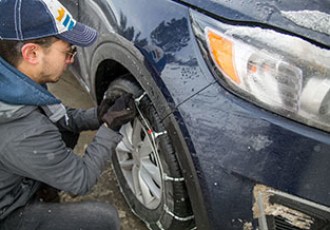BestReviews is reader-supported and may earn an affiliate commission. Details
We recommend these products based on an intensive research process that's designed to cut through the noise and find the top products in this space. Guided by experts, we spend hours looking into the factors that matter, to bring you these selections.

When you need to detach your boat or trailer from your bumper hitch, a tongue jack is an indispensable piece of equipment that’s usually pretty durable. But sometimes they get damaged, and they all wear out eventually — particularly those that are regularly near the sea, where the environment can quickly eat into metals.
That’s not the only reason to be shopping for a new tongue jack though. If you’re fed up with winding a handle on a manual jack, upgrading to an easy electric jack may appeal to you. You should also consider the tongue jack’s durability, whether it can resist corrosion, and which additional features (such as foot pads and LED lights) you’ll need to get the best results.
To learn more about the technical aspects, read our shopping guide below. If you’re ready to buy, we have several recommendations for a range of price and performance needs.

When shopping for a tongue jack, there are two basics to look for: the maximum load rating and whether it’s manual or electric.
Load rating
Finding the right load rating isn’t complicated. Most tongue jacks fall into one of three brackets:
Note: The maximum in general use is 8,000 pounds, but they can be rated as high as 40,000 pounds.
Electric vs. manual tongue jacks
Electric tongue jacks have various features that we’ll look at in a minute, but the big advantage is that they just go up and down at the press of a button rather than needing to be wound with a handle.
Manual jacks offer a couple of variations:
Even the most lightweight tongue jack is going to undergo considerable presses during its working life, so you want to look for robust construction, substantial material cross section, good weld quality, and sizable nuts and bolts.
Corrosion is one of the biggest enemies of any trailer component or accessory. The cheapest jacks are just painted — which is OK but not the toughest finish available. Epoxy resin coating (also called powdered coating) is heated and bonded to the metal surfaces and offers greater protection. Zinc or chrome plating may also be used. These are great at inhibiting rust but are more expensive than epoxy, which is why they are not as common.

Inexpensive: There are some surprisingly cheap tongue jacks around, but we would be cautious of anything under $30. For $30 to $50, you’ll find numerous models that are more than adequate for modest-sized boat and utility trailers — up to around 1,200 pounds.
Mid-range: The next weight bracket is 2,500 to 3,500 pounds, and manual jacks with this rating will cost you anywhere from $75 to $120. At the top end of those prices, you’ll also start to see basic electric tongue jacks, though they can get close to $200.
Expensive: When you get to true heavy-duty tongue jacks — 4,000 pounds plus — there are a few manual models, and those usually need to be welded to the trailer frame. Electric jacks capable of lifting this much typically range in price from $180 to $350, depending on features.

The BAL 29015B 1,000-pound Sidewind Trailer Tongue Jack is cheap and durable. The 1 7/8” outer diameter makes it particularly popular with owners of boat and utility trailers designed in the 1970s and ’80s. If you’ve got really heavy loads to support, the Reese Pro Series Square Jack will handle up to 8,000 pounds, which is impressive from a low-cost manual model. But there is one drawback: there is no bolt fixing, it has to be welded on. You get plenty of power and great convenience with the Husky 82022 Super Brute Electric Jack. It’s rated for up to a 5,000-pound load, runs at 6” per minute (18” maximum lift), and it’s remote controlled.

Q. Is there any difference between an A-frame jack and a tongue jack?
A. Not normally. The A-frame describes the type of tow hitch (technically the “tongue”) fitted to your trailer. Often it’s a straight beam, sometimes an “A” shape. All you really need do is check that the size and mounting kit will fit. Some will fit both types of tow hitch, some are specified particularly for A-frames.
Q. Are tongue jacks difficult to fit?
A. No. With manual ones, it’s just a question of doing up a few nuts and bolts. Electric models require power but at most it’s two wires — live and ground. On most seven-way connectors, ground is usually done already (check anyway). Your manufacturer should provide clear advice, and there are also a number of helpful videos available online.
Q. Do tongue jacks need much maintenance?
A. It’s a device that’s often overlooked, even by people who clean their trailers regularly, and neglect will shorten its operating life. However, looking after your tongue jack isn’t difficult, and the maker will provide instructions. Though some are sealed units, most recommend lubrication of the main screw a couple of times a year, usually with grease rather than oil (which isn’t sticky enough). Terminals on electric models should be checked for corrosion.
Get emails you’ll love.
Learn about the products you’re wondering if you should buy and get advice on using your latest purchases.
BestReviews wants to be better. Please take our 3-minute survey,
and give us feedback about your visit today.
